2021-2022学年人教版英语七年级下册Unit 10 Section B 词汇讲解 课件 (31张)
文档属性
| 名称 | 2021-2022学年人教版英语七年级下册Unit 10 Section B 词汇讲解 课件 (31张) | 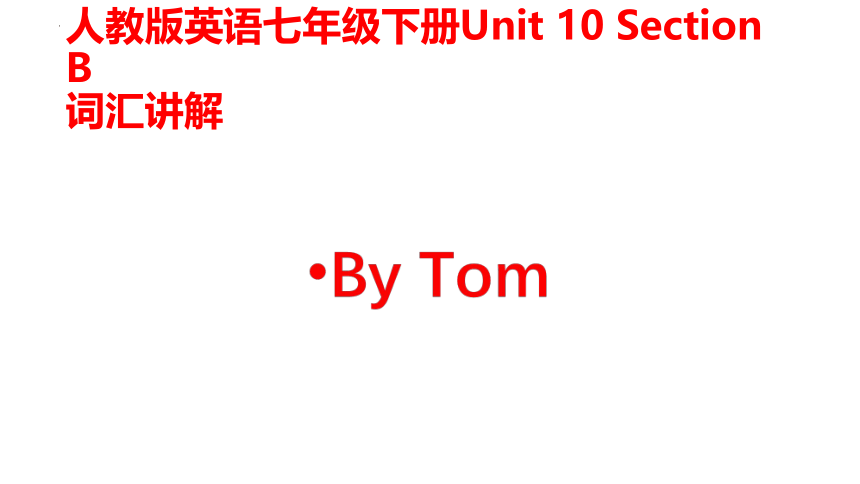 | |
| 格式 | pptx | ||
| 文件大小 | 130.9KB | ||
| 资源类型 | 教案 | ||
| 版本资源 | 人教新目标(Go for it)版 | ||
| 科目 | 英语 | ||
| 更新时间 | 2022-05-16 21:59:55 | ||
图片预览

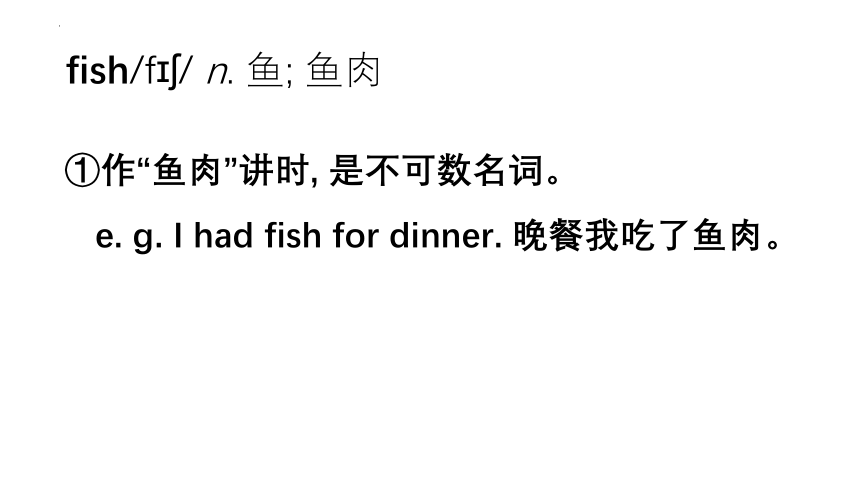
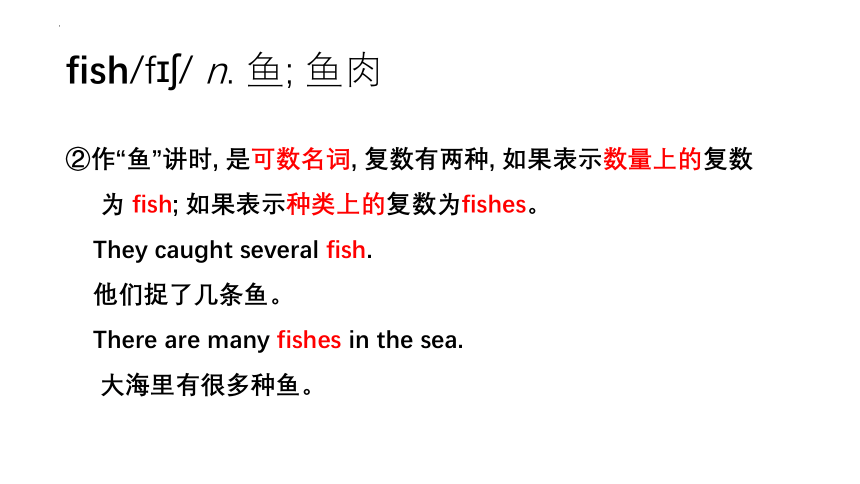
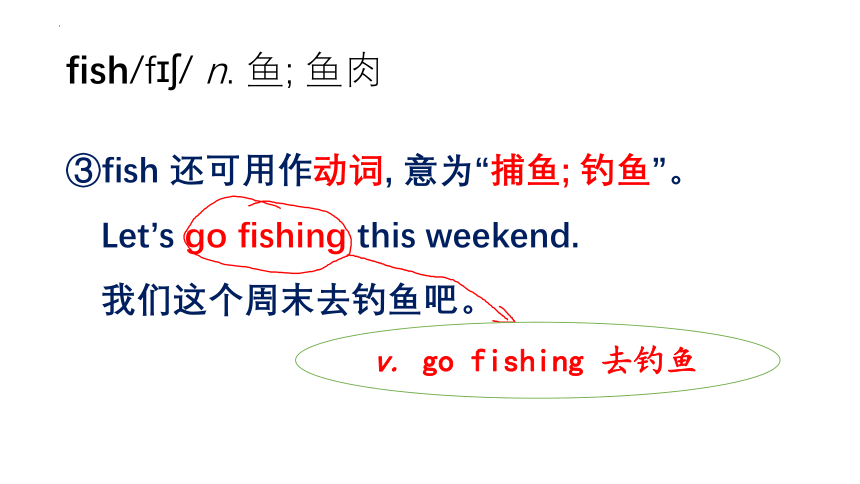
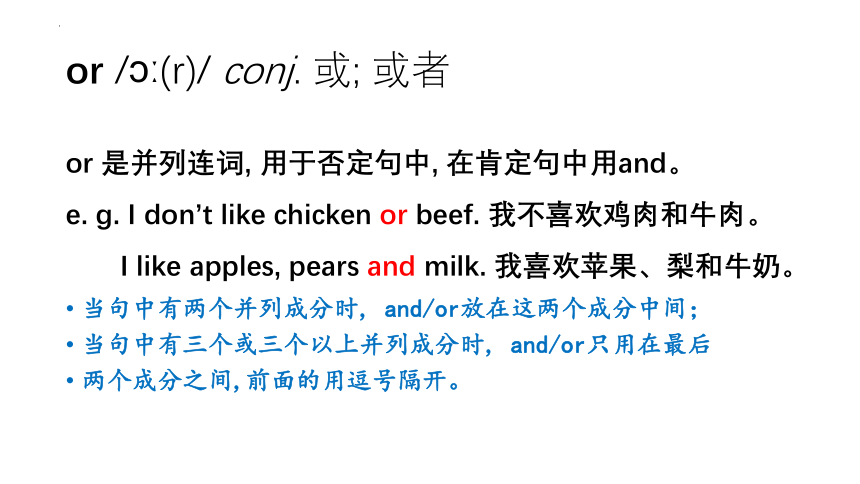
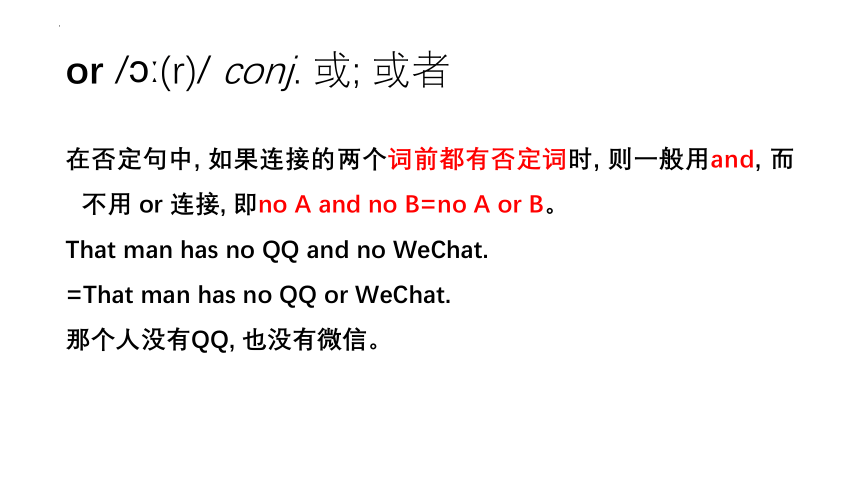
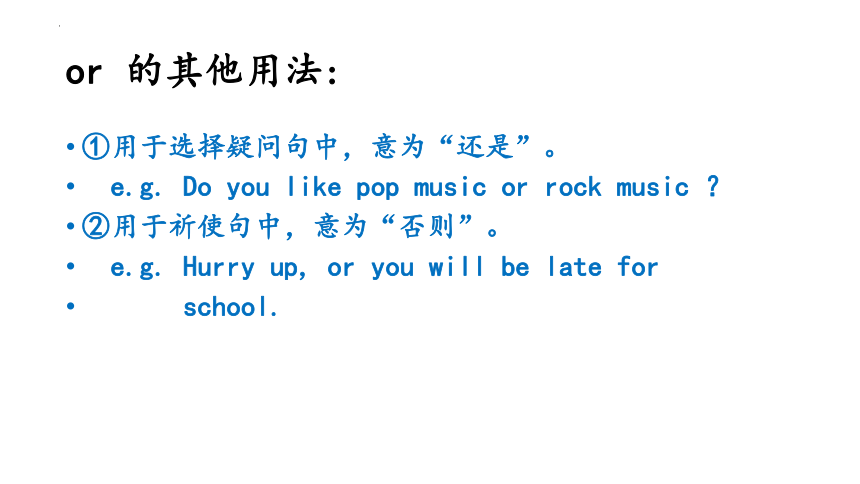
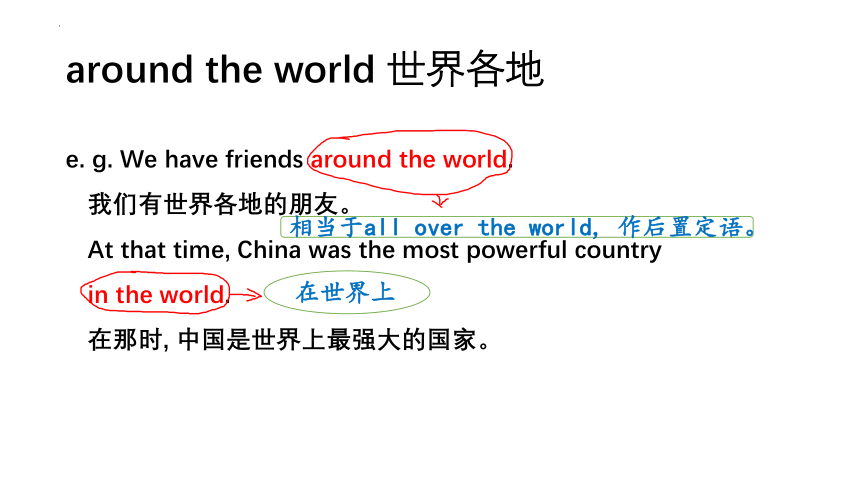
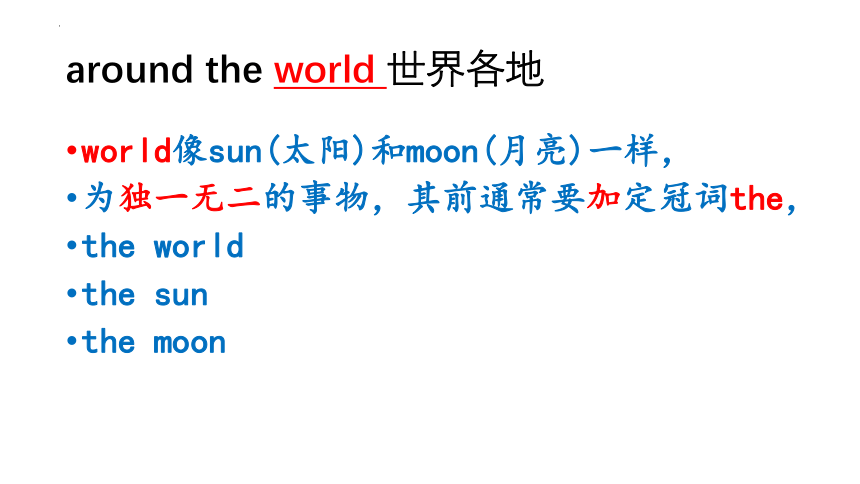
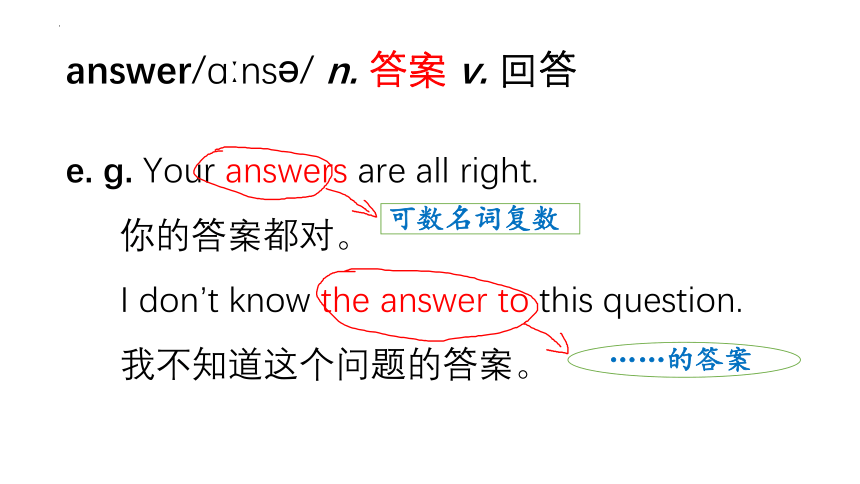
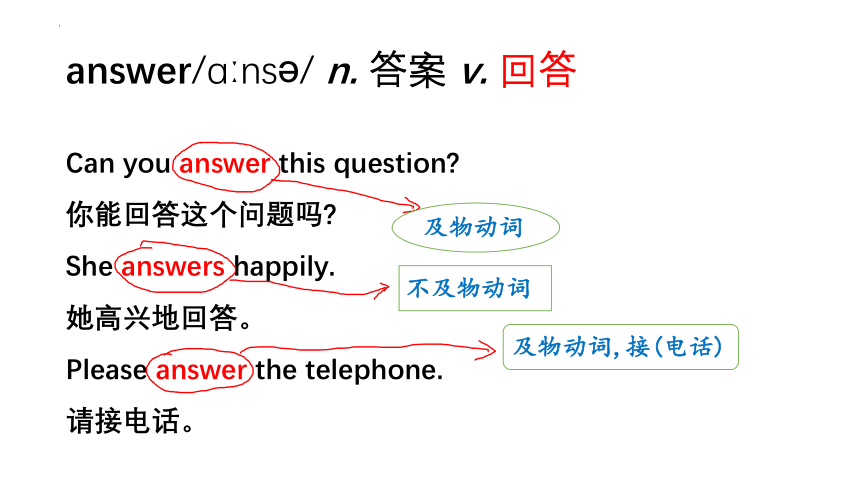
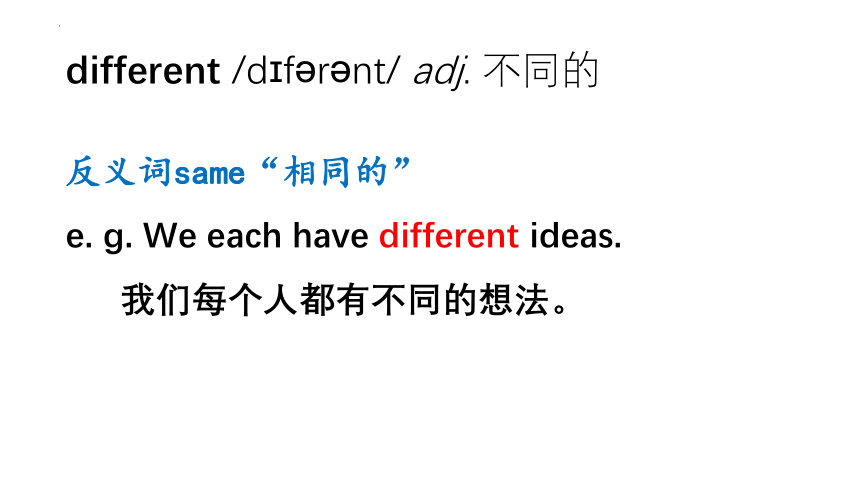
文档简介
(共31张PPT)
人教版英语七年级下册Unit 10 Section B
词汇讲解
fish/f / n. 鱼; 鱼肉
①作“鱼肉”讲时, 是不可数名词。
e. g. I had fish for dinner. 晚餐我吃了鱼肉。
fish/f / n. 鱼; 鱼肉
②作“鱼”讲时, 是可数名词, 复数有两种, 如果表示数量上的复数
为 fish; 如果表示种类上的复数为fishes。
They caught several fish.
他们捉了几条鱼。
There are many fishes in the sea.
大海里有很多种鱼。
fish/f / n. 鱼; 鱼肉
③fish 还可用作动词, 意为“捕鱼; 钓鱼”。
Let’s go fishing this weekend.
我们这个周末去钓鱼吧。
v. go fishing 去钓鱼
or / (r)/ conj. 或; 或者
or 是并列连词, 用于否定句中, 在肯定句中用and。
e. g. I don’t like chicken or beef. 我不喜欢鸡肉和牛肉。
I like apples, pears and milk. 我喜欢苹果、梨和牛奶。
当句中有两个并列成分时, and/or放在这两个成分中间;
当句中有三个或三个以上并列成分时, and/or只用在最后
两个成分之间,前面的用逗号隔开。
or / (r)/ conj. 或; 或者
在否定句中, 如果连接的两个词前都有否定词时, 则一般用and, 而不用 or 连接, 即no A and no B=no A or B。
That man has no QQ and no WeChat.
=That man has no QQ or WeChat.
那个人没有QQ, 也没有微信。
or 的其他用法:
①用于选择疑问句中,意为“还是”。
e.g. Do you like pop music or rock music ?
②用于祈使句中,意为“否则”。
e.g. Hurry up, or you will be late for
school.
around the world 世界各地
e. g. We have friends around the world.
我们有世界各地的朋友。
At that time, China was the most powerful country
in the world.
在那时, 中国是世界上最强大的国家。
相当于all over the world, 作后置定语。
在世界上
around the world 世界各地
world像sun(太阳)和moon(月亮)一样,
为独一无二的事物,其前通常要加定冠词the,
the world
the sun
the moon
answer/ɑ ns / n. 答案 v. 回答
e. g. Your answers are all right.
你的答案都对。
I don’t know the answer to this question.
我不知道这个问题的答案。
可数名词复数
……的答案
answer/ɑ ns / n. 答案 v. 回答
Can you answer this question
你能回答这个问题吗
She answers happily.
她高兴地回答。
Please answer the telephone.
请接电话。
及物动词
不及物动词
及物动词,接(电话)
different /d f r nt/ adj. 不同的
反义词same“相同的”
e. g. We each have different ideas.
我们每个人都有不同的想法。
different /d f r nt/ adj. 不同的
① different 的副词形式是differently; 名词形式
是difference, 意为“不同; 差异”。
e. g. He does things differently. 他做事很不同。
There are many differences between Chinese culture and Western culture. 中国文化和西方文化之间有很多不同。
different /d f r nt/ adj. 不同的
② be different from 与……不同,
反义短语是be the same as 与……相同。
e. g. My eating habits are different from yours.
我的饮食习惯与你的不同。
age /e d / n. 年龄
e. g. What’s your age =How old are you 你多大了
He could play the piano at the age of 4.
=He could play the piano when he was
4 years old.
他在4 岁时就会弹钢琴了。
在……岁数时
age用法小结
What’s one’s age
=How old is sb.
at the age of“在……岁时”,
可转换为when引导的时间状语从句。
make a wish 许愿
e. g. I want to make a wish tonight. 今晚我想许个愿。
My wish is to become a doctor.
我的愿望是成为一名医生。
Give my best wishes to your parents.
把我最美好的祝愿送给你的父母。
wish 的用法
①wish to do sth.
希望做某事
②wish+ 从句
希望……
③wish sb./sth. to do sth.
希望某人/ 某物做某事
make a wish 许愿 make的用法
make 有两种词性:
①使役动词, 意为“使得”, 后面接不带to 的不
定式的复合结构或形容词等作宾语补足语;
②行为动词, 意为“制造; 做”, 后面接名词, 强
调做的东西。
blow out 意为“吹灭”
是“动词+ 副词”的结构。宾语是代词时,
要置于blow 和out 中间。
e. g. The candle is still burning. Please blow it out.
蜡烛还在燃烧着, 请把它吹灭。
The wind is blowing. 风在刮。
代词放在中间
If / f/conj. (表条件)如果
if 引导的条件状语从句构成主从复合句, 主句用一般将来时, if 引导的条件状语从句用一般现在时表示将来, 即“主将从现”。
e. g. If it rains tomorrow, we’ll stay at home.
如果明天下雨, 我们将待在家里。
if从句放在句首时,
从句后常加逗号,与主句隔开。
get /ɡet/ v. 变得
e. g. We get wiser as we grow up.
随着我们的成长, 我们变得更明智了。
类似的动词还有:look, sound, smell,
taste, feel 等。
用作系动词,多用于表示感情、气候和环境的变化,后接形容词原级或比较级。
get, become, turn与grow
get: 指人的感情、身体状况、自然或社会发生变化,
become: 指身份、职位的变化; 用作瞬间动词时,
后多接比较级。指状态的变化, 强调变
化的结果。
turn: 指颜色和性质方面变得与原来不同。
grow: 着重变化过程, 表示“逐渐变成”,
多指生长性变化。
如此多“变”
get, become, turn与grow例句
e. g. He became an artist.
他成为了一名艺术家。
The weather gets colder, and the day gets shorter.
天气变得更冷了, 白天变得更短了。
His face turned red. 他的脸变红了。
As time went on, he grew more and more impatient.
随着时间的流逝, 他变得越来越没有耐心了。
popular /p pj l / adj. 受欢迎的; 普遍的
e. g. This kind of sweater is very popular.
这种毛衣非常流行。
She is a popular teacher in our school.
她是我们学校一位受欢迎的老师。
Popular songs are popular with young people.
流行歌受年轻人的欢迎。
popular的相关短语
get popular
变得受欢迎,流行
be popular with
受……欢迎
cut up 切碎
e. g. —Why do you cut the apple up
(cut up the apple)
你为什么把苹果切碎了
—I cut it up because I want to make apple salad.
我切碎它是因为我想做苹果沙拉。
名词作宾语,放在中间或后面均可。
代词作宾语,放在两词之间。
与cut 相关的短语
cut down 砍倒;削减
cut off 切掉
cut...into 把……切成
cut in 插嘴
idea /a d / n. 想法; 主意
e. g. I have a good idea.
我有一个好主意。
I have an idea that he will come today.
我有一个想法, 他今天会来的。
idea 以元音音素开头,用an 修饰。
idea的用法
①当别人提出一个好的建议和想法时,我们通常用
That’s a good idea !或Good idea!来表示同意。
②I have no idea. 意为“我不知道”。
相当于“I don’t know.”。
谢谢观看
Thank you for watching!
人教版英语七年级下册Unit 10 Section B
词汇讲解
fish/f / n. 鱼; 鱼肉
①作“鱼肉”讲时, 是不可数名词。
e. g. I had fish for dinner. 晚餐我吃了鱼肉。
fish/f / n. 鱼; 鱼肉
②作“鱼”讲时, 是可数名词, 复数有两种, 如果表示数量上的复数
为 fish; 如果表示种类上的复数为fishes。
They caught several fish.
他们捉了几条鱼。
There are many fishes in the sea.
大海里有很多种鱼。
fish/f / n. 鱼; 鱼肉
③fish 还可用作动词, 意为“捕鱼; 钓鱼”。
Let’s go fishing this weekend.
我们这个周末去钓鱼吧。
v. go fishing 去钓鱼
or / (r)/ conj. 或; 或者
or 是并列连词, 用于否定句中, 在肯定句中用and。
e. g. I don’t like chicken or beef. 我不喜欢鸡肉和牛肉。
I like apples, pears and milk. 我喜欢苹果、梨和牛奶。
当句中有两个并列成分时, and/or放在这两个成分中间;
当句中有三个或三个以上并列成分时, and/or只用在最后
两个成分之间,前面的用逗号隔开。
or / (r)/ conj. 或; 或者
在否定句中, 如果连接的两个词前都有否定词时, 则一般用and, 而不用 or 连接, 即no A and no B=no A or B。
That man has no QQ and no WeChat.
=That man has no QQ or WeChat.
那个人没有QQ, 也没有微信。
or 的其他用法:
①用于选择疑问句中,意为“还是”。
e.g. Do you like pop music or rock music ?
②用于祈使句中,意为“否则”。
e.g. Hurry up, or you will be late for
school.
around the world 世界各地
e. g. We have friends around the world.
我们有世界各地的朋友。
At that time, China was the most powerful country
in the world.
在那时, 中国是世界上最强大的国家。
相当于all over the world, 作后置定语。
在世界上
around the world 世界各地
world像sun(太阳)和moon(月亮)一样,
为独一无二的事物,其前通常要加定冠词the,
the world
the sun
the moon
answer/ɑ ns / n. 答案 v. 回答
e. g. Your answers are all right.
你的答案都对。
I don’t know the answer to this question.
我不知道这个问题的答案。
可数名词复数
……的答案
answer/ɑ ns / n. 答案 v. 回答
Can you answer this question
你能回答这个问题吗
She answers happily.
她高兴地回答。
Please answer the telephone.
请接电话。
及物动词
不及物动词
及物动词,接(电话)
different /d f r nt/ adj. 不同的
反义词same“相同的”
e. g. We each have different ideas.
我们每个人都有不同的想法。
different /d f r nt/ adj. 不同的
① different 的副词形式是differently; 名词形式
是difference, 意为“不同; 差异”。
e. g. He does things differently. 他做事很不同。
There are many differences between Chinese culture and Western culture. 中国文化和西方文化之间有很多不同。
different /d f r nt/ adj. 不同的
② be different from 与……不同,
反义短语是be the same as 与……相同。
e. g. My eating habits are different from yours.
我的饮食习惯与你的不同。
age /e d / n. 年龄
e. g. What’s your age =How old are you 你多大了
He could play the piano at the age of 4.
=He could play the piano when he was
4 years old.
他在4 岁时就会弹钢琴了。
在……岁数时
age用法小结
What’s one’s age
=How old is sb.
at the age of“在……岁时”,
可转换为when引导的时间状语从句。
make a wish 许愿
e. g. I want to make a wish tonight. 今晚我想许个愿。
My wish is to become a doctor.
我的愿望是成为一名医生。
Give my best wishes to your parents.
把我最美好的祝愿送给你的父母。
wish 的用法
①wish to do sth.
希望做某事
②wish+ 从句
希望……
③wish sb./sth. to do sth.
希望某人/ 某物做某事
make a wish 许愿 make的用法
make 有两种词性:
①使役动词, 意为“使得”, 后面接不带to 的不
定式的复合结构或形容词等作宾语补足语;
②行为动词, 意为“制造; 做”, 后面接名词, 强
调做的东西。
blow out 意为“吹灭”
是“动词+ 副词”的结构。宾语是代词时,
要置于blow 和out 中间。
e. g. The candle is still burning. Please blow it out.
蜡烛还在燃烧着, 请把它吹灭。
The wind is blowing. 风在刮。
代词放在中间
If / f/conj. (表条件)如果
if 引导的条件状语从句构成主从复合句, 主句用一般将来时, if 引导的条件状语从句用一般现在时表示将来, 即“主将从现”。
e. g. If it rains tomorrow, we’ll stay at home.
如果明天下雨, 我们将待在家里。
if从句放在句首时,
从句后常加逗号,与主句隔开。
get /ɡet/ v. 变得
e. g. We get wiser as we grow up.
随着我们的成长, 我们变得更明智了。
类似的动词还有:look, sound, smell,
taste, feel 等。
用作系动词,多用于表示感情、气候和环境的变化,后接形容词原级或比较级。
get, become, turn与grow
get: 指人的感情、身体状况、自然或社会发生变化,
become: 指身份、职位的变化; 用作瞬间动词时,
后多接比较级。指状态的变化, 强调变
化的结果。
turn: 指颜色和性质方面变得与原来不同。
grow: 着重变化过程, 表示“逐渐变成”,
多指生长性变化。
如此多“变”
get, become, turn与grow例句
e. g. He became an artist.
他成为了一名艺术家。
The weather gets colder, and the day gets shorter.
天气变得更冷了, 白天变得更短了。
His face turned red. 他的脸变红了。
As time went on, he grew more and more impatient.
随着时间的流逝, 他变得越来越没有耐心了。
popular /p pj l / adj. 受欢迎的; 普遍的
e. g. This kind of sweater is very popular.
这种毛衣非常流行。
She is a popular teacher in our school.
她是我们学校一位受欢迎的老师。
Popular songs are popular with young people.
流行歌受年轻人的欢迎。
popular的相关短语
get popular
变得受欢迎,流行
be popular with
受……欢迎
cut up 切碎
e. g. —Why do you cut the apple up
(cut up the apple)
你为什么把苹果切碎了
—I cut it up because I want to make apple salad.
我切碎它是因为我想做苹果沙拉。
名词作宾语,放在中间或后面均可。
代词作宾语,放在两词之间。
与cut 相关的短语
cut down 砍倒;削减
cut off 切掉
cut...into 把……切成
cut in 插嘴
idea /a d / n. 想法; 主意
e. g. I have a good idea.
我有一个好主意。
I have an idea that he will come today.
我有一个想法, 他今天会来的。
idea 以元音音素开头,用an 修饰。
idea的用法
①当别人提出一个好的建议和想法时,我们通常用
That’s a good idea !或Good idea!来表示同意。
②I have no idea. 意为“我不知道”。
相当于“I don’t know.”。
谢谢观看
Thank you for watching!
同课章节目录
- Unit 1 Can you play the guitar?
- Section A
- Section B
- Unit 2 What time do you go to school?
- Section A
- Section B
- Unit 3 How do you get to school?
- Section A
- Section B
- Unit 4 Don't eat in class.
- Section A
- Section B
- Unit 5 Why do you like pandas?
- Section A
- Section B
- Unit 6 I'm watching TV.
- Section A
- Section B
- Review of Units 1-6
- Unit 7 It's raining!
- Section A
- Section B
- Unit 8 Is there a post office near here?
- Section A
- Section B
- Unit 9 What does he look like?
- Section A
- Section B
- Unit 10 I'd like some noodles.
- Section A
- Section B
- Unit 11 How was your school trip?
- Section A
- Section B
- Unit 12 What did you do last weekend?
- Section A
- Section B
